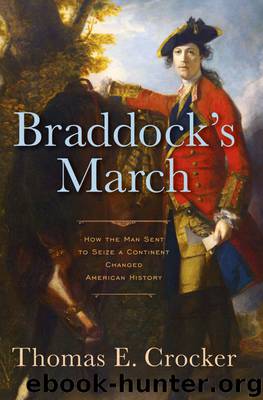Braddock's March by Thomas E. Crocker

Author:Thomas E. Crocker
Language: eng
Format: epub
Publisher: Westholme Publishing
Published: 2017-05-13T16:00:00+00:00
CHAPTER FIFTEEN
The Flying Column
THE CANDLES FLICKERED IN THE THICK night heat of the general’s tent at Little Meadows. So did tempers, fueled by wine at His Excellency’s dinner table (apparently Braddock continued to carry his cellar with him, despite the shortage of wagons and horses). Colonel Dunbar had been asked his opinion of great generals under whom he had served. The avuncular colonel was expounding with reason and examples of what distinguished his former commanding officers. Braddock smiled indulgently from the head of the table. The asp-tongued Orme retorted that Dunbar’s discourse was so much “stuff.”
“You might as well be talking of your grandmother,” Captain Orme sniffed.
“Sir, if she was alive,” the older and more experienced Dunbar replied, “she would have more sense, more good manners, and know as much of military matters as you do.”
Braddock coughed and intervened. “Gentlemen, you are both warm.”
“General,” Dunbar protested, “you see the provocation I got.”
The matter ended there, but Braddock never again sought Dunbar’s opinion on any matter. He relegated him to a supporting role. Orme had succeeded in splitting the general from both of his deputy commanders.
The three days spent at Little Meadows shaped the course of the remainder of the expedition, with devastating consequences.
Braddock fought the fear that his convoy was not operating as effectively as it should. In many ways a perfectionist, he continued to tinker with methods to increase its speed and compactness. His concern grew as the likelihood of fresh reinforcements arriving at Fort Duquesne or of an Indian ambush along the line of march increased with each passing day. The general solicited the views of his officers. He conferred with Washington, knowing that he had marched the route the year before. Because he was familiar with the mobility of the Indian traders, Washington advocated fewer wagons and more packhorses. Washington then made a fateful recommendation. Perhaps it had already been at the back of Braddock’s mind. Washington “urged it in the warmest terms I was master of, to push on; if we even did it with a chosen detachment for that purpose, with the artillery and such other things as were absolutely necessary.”1
On Tuesday, June 17, without calling a council of war, Braddock made the decision to split his troops. He would establish a “flying column” of hand-picked troops to sprint to Fort Duquesne and lead the assault. To cut the road, St. Clair would depart the next day with four hundred men, two companies of Virginia rangers, and the Indian scouts. Braddock would follow the day after with his military family, the two senior Grenadier companies, five hundred and fifty of the best soldiers from the two line regiments, all brought from Ireland, as well as the sailors under Spendelow and eighteen of the Virginia light horse troop that had acted as his bodyguard earlier on the march. The remainder of the troops were to follow under Dunbar with most of the baggage as best they could. No women were to accompany the flying column, an order which was in practice disobeyed.
Download
This site does not store any files on its server. We only index and link to content provided by other sites. Please contact the content providers to delete copyright contents if any and email us, we'll remove relevant links or contents immediately.
| Africa | Asia |
| Canadian | Europe |
| Holocaust | Latin America |
| Middle East | United States |
Fanny Burney by Claire Harman(26602)
Empire of the Sikhs by Patwant Singh(23084)
Out of India by Michael Foss(16853)
Leonardo da Vinci by Walter Isaacson(13336)
Small Great Things by Jodi Picoult(7139)
The Six Wives Of Henry VIII (WOMEN IN HISTORY) by Fraser Antonia(5514)
The Wind in My Hair by Masih Alinejad(5095)
A Higher Loyalty: Truth, Lies, and Leadership by James Comey(4959)
The Crown by Robert Lacey(4814)
The Lonely City by Olivia Laing(4801)
Millionaire: The Philanderer, Gambler, and Duelist Who Invented Modern Finance by Janet Gleeson(4478)
The Iron Duke by The Iron Duke(4354)
Papillon (English) by Henri Charrière(4274)
Sticky Fingers by Joe Hagan(4197)
Joan of Arc by Mary Gordon(4109)
Alive: The Story of the Andes Survivors by Piers Paul Read(4031)
Stalin by Stephen Kotkin(3965)
Aleister Crowley: The Biography by Tobias Churton(3640)
Ants Among Elephants by Sujatha Gidla(3467)
